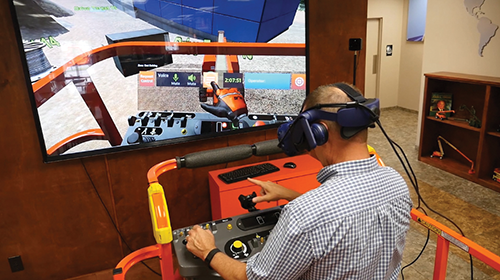Construction workers have safety concerns regarding automation
A recent survey has revealed safety is construction workers' top concern when automation increases at job sites, according to www.forconstructionpros.com.
In a poll of 205 U.S. and U.K. construction workers conducted on behalf of Volvo Construction Equipment, 46% of respondents highlighted the increased risk to job-site safety compared with 31% who are concerned about job security. Other concerns include loss of sociability (26%) and not knowing whom to blame if something goes wrong (17%). However, experts say automation potentially can reduce job-site hazards.
Despite their safety concerns, survey respondents identified benefits automated job-site technology can offer. More than half of respondents (54%) believe autonomous machines and artificial intelligence will boost productivity, and 48% believe advanced technology will increase the speed of daily construction tasks. Construction workers between ages 25 and 44 are more likely to believe autonomous machinery can benefit areas such as productivity, speed, safety, quality and fuel efficiency compared with construction workers age 45 and older.
Job security is the second-largest concern construction workers expressed regarding increased job-site automation. Nearly half of survey respondents (48%) believe machine operators are most at risk of losing their jobs; three in five machine operators believe their job could become completely redundant following the rise in computer technology. Other job roles respondents believe would be at risk are engineers (21%), bricklayers (17%) and construction managers (16%). Only one in five construction workers believe no jobs will be affected.
From those who responded as part of a wider survey across all industries, 55% of workers say they would rather lose their jobs to a human than a machine. Artificial intelligence may affect some workers' career choices—72% of U.S. respondents agreed in some capacity they would consider choosing a job that will not be affected by autonomous machinery or artificial intelligence compared with 45% of U.K. respondents. Fifty-eight percent of construction workers are confident artificial intelligence would not do a better job than them.
Construction industry uses simulators to recruit young workers
 JLG Industries' access equipment training simulator |
To recruit young workers, some construction companies are introducing realistic computer simulators at high schools and community colleges across the U.S., according to www.sfgate.com.
In the absence of opportunities for students to visit real construction job sites, simulators allow students to explore the complexities of operating heavy machines such as bulldozers, cranes and excavators. Professional simulators rely on physics and collision engines to create an immersion experience, and operating the simulated machines requires more than pressing a button. Most simulators have real controls in the proper locations to help users develop muscle memory, and the machine's sounds are accurately reproduced.
Trey Henry, a 17-year-old senior at the Academy for Career Education trade school in Reno, Nev., attends a simulator program at the Nevada chapter of the Associated General Contractors that serves as training for him and scouting for his instructors, who work for local construction companies. To start an excavator simulator, Henry must turn a key, increase the throttle speed, engage the hydraulic lock and buckle his seat belt.
"I was on the excavator and digging a trench, and I got stuck a little bit, and it jerks you like you're stuck," Henry says. "You actually feel the chair moving when you pull the dirt."
The excavator simulator has three screens and can be used with a virtual reality headset that produces a 360-degree view. Two pedals operate the tracks, and joysticks move the boom and open the bucket.
Henry has spent about seven hours on the simulator and says his experience has persuaded him to pursue a career working with heavy machinery.



